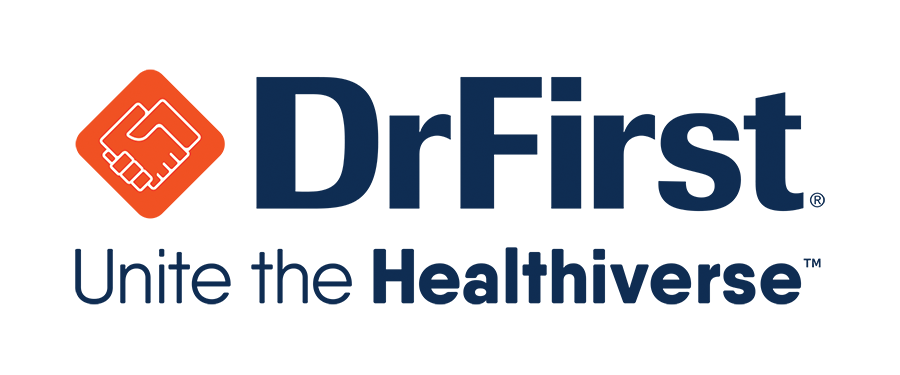Integrated workflows ease staff burden and satisfy regulatory mandates.
E-PRESCRIBING COLLABORATION IS A PRESCRIPTION FOR PATIENT SAFETY | DrFirst

MedStar Health, DrFirst, Area Health Plans and Pharmacies Seek to Reduce Medication Errors and Time with New Technologies
February 25, 2003
WASHINGTON, D.C.—With more than 3.1 billion retail prescriptions filled annually, the risk of medication errors is a growing concern for consumers, healthcare practitioners and pharmacists alike. A 1999 landmark study by the National Academy of Sciences’ Institute of Medicine estimated that more Americans die each year from medication errors than from workplace injuries. A comprehensive e-prescribing pilot project is being launched this week in the Washington, D.C./Baltimore area that seeks to make medication errors caused by illegible handwriting and other preventable prescribing complications a thing of the past.
The project is a collaboration among the Council for Affordable Quality Healthcare (CAQH), a not-for-profit alliance of the nation’s leading health plans and networks; DrFirst, a leading provider of IT solutions for physicians and hospitals; and MedStar Health, the region’s largest health system. This unique partnership has produced a system that improves patient safety and addresses the major stumbling blocks that have historically hindered physician adoption of e-prescribing programs, such as the need for multiple stakeholders to work together to reduce the time and cost of integrating these systems into the physician office workflow.
During the yearlong pilot, 200 physicians will use the system to write an estimated 1 million prescriptions. Physicians recruited for the project include affiliates of MedStar Health and existing users of DrFirst’s e-prescribing technology. All area pharmacies will accept prescriptions written using the system, and several will assist with analyzing the impact of the pilot on reducing pharmacists’ workloads, including MedStar Health’s Ensign Pharmacies, and local pharmacies in Safeway stores.
“This physicians can use the system to submit prescriptions directly to area pharmacies from any computer, desktop or handheld that is connected to the Internet, or via fax. Ensign Pharmacies and Safeway will actively monitor the process to measure the system’s effectiveness in reducing time spent filling prescriptions, preventing adverse drug and allergy interactions, filling prescriptions accurately and complying with insurance formularies.
“This pilot program will demonstrate that e-prescribing is the future of healthcare, driving safer, higher-quality and more cost-effective solutions in the healthcare industry,” said John Bartos, senior vice president, e-Health Products and Services, at DrFirst. “We think a unique model like this that brings together all the key players—providers, payers, pharmacists and technology vendors—will form the basis of the healthcare infrastructure in the 21st century.”
“Safeway views this pilot as one more step towards patient safety in the prescribing process,” said Rich Cancilla, vice president of pharmacy operations at Safeway, one of the pharmacies participating in the project. “We’ll actively monitor prescriptions sent to our stores to measure the system’s effectiveness in achieving the projected results.”
E-prescribing is a necessary advance, according to Janet Marchibroda, CEO of the Washington, D.C.-based e-Health Initiative, a non-profit organization dedicated to improving the quality, safety and cost-effectiveness of healthcare through information technology. “We cannot continue to ignore the looming body of evidence that suggests the use of information technology substantially reduces medication errors and related costs,” she said.
About CAQH
The Council for Affordable Quality Healthcare (CAQH) is a not-for-profit alliance of America’s leading health plans and networks, committed to improving the quality of healthcare and reducing administrative burdens for physicians, patients and payers. Created in 1999, CAQH member organizations today provide and administer healthcare coverage for more than 100 million Americans.
About MedStar Health
MedStar Health, Inc., (www.medstarhealth.org) based in Columbia, MD, is a not-for-profit, community-based healthcare organization comprising 25 integrated businesses including seven teaching hospitals in the Baltimore/Washington area. The hospitals include Franklin Square Hospital Center, Good Samaritan Hospital, Harbor Hospital, and Union Memorial Hospital in Baltimore, and Washington Hospital Center, Georgetown University Hospital and National Rehabilitation Hospital in Washington, DC. The third largest employer in the region, with 22,000 employees and 4,000 affiliated physicians, MedStar Health hospitals and healthcare organizations serve more than 500,000 patients each year.
DrFirst also provides the industries best secure messaging platform, for physicians, hospitals and EMR/EHR vendors.


